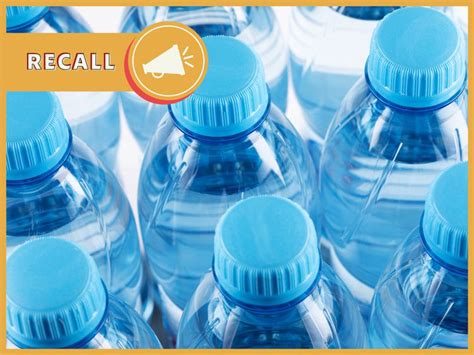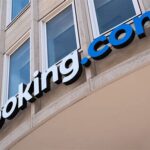
Costco members are urged to check their refrigerators after a voluntary recall was issued for bottled water sold under the Kirkland Signature brand in certain regions of the western United States due to potential contamination with Pseudomonas aeruginosa. The recall, announced by Niagara Bottling, LLC, affects Kirkland Signature bottled water produced at specific facilities, raising concerns about possible health risks, particularly for individuals with weakened immune systems.
Costco shoppers in several western states should immediately inspect their Kirkland Signature bottled water for specific product codes and dates, as a voluntary recall has been initiated due to the potential presence of Pseudomonas aeruginosa bacteria. Niagara Bottling, LLC, the manufacturer, issued the recall after discovering a potential contamination source at one of its bottling facilities. The affected water was sold at Costco stores in parts of California, Nevada, and Washington. The recall is limited to specific production dates and lot codes, and consumers are advised to check the details provided by Costco and Niagara Bottling to determine if their purchased water is impacted. While Pseudomonas aeruginosa typically poses little risk to healthy individuals, it can cause infections in those with compromised immune systems.
The recall, initiated in late May, stems from concerns over possible bacterial contamination during the manufacturing process. According to Niagara Bottling, routine testing identified the presence of Pseudomonas aeruginosa in the water source at a Pennsylvania manufacturing plant. While the company emphasizes that no illnesses have been directly linked to the recalled water, the decision to issue a voluntary recall was made out of an abundance of caution to protect consumer health. The affected Kirkland Signature bottled water was sold in bulk packs at Costco warehouses and online. Costco has already begun notifying its members who purchased the potentially contaminated water, providing instructions on how to identify the recalled product and receive a refund.
“We are committed to providing safe, high-quality drinking water to our customers,” stated a representative from Niagara Bottling in a press release. “We are taking this action voluntarily to ensure the well-being of our consumers. Although Pseudomonas aeruginosa rarely causes serious illness in healthy individuals, we are urging anyone who purchased the affected product to discontinue use and contact us for a full refund.”
The recall affects specific lot codes and production dates of Kirkland Signature bottled water sold in 40-count packages. Consumers can identify the recalled product by checking the codes printed on the bottle. Costco has published a detailed list of the affected codes on its website and has also sent email notifications to members who purchased the water online or in-store using their membership card. The affected product was distributed between a specific timeframe in April and May of this year, and consumers are advised to check their water regardless of when it was purchased to ensure it is not part of the recalled batch.
Pseudomonas aeruginosa is a common bacterium found in soil and water. It can cause a variety of infections, including pneumonia, bloodstream infections, and urinary tract infections. People with weakened immune systems, such as those with cystic fibrosis, HIV/AIDS, or those undergoing chemotherapy, are at a higher risk of developing serious infections from Pseudomonas aeruginosa. While healthy individuals are typically not affected, the presence of the bacteria in drinking water can pose a potential health risk, particularly for vulnerable populations.
Health officials recommend that anyone who has consumed the recalled water and experiences symptoms such as fever, chills, body aches, nausea, vomiting, or diarrhea should seek medical attention immediately. These symptoms could indicate a Pseudomonas aeruginosa infection, and prompt treatment with antibiotics may be necessary to prevent serious complications. Individuals with compromised immune systems should be particularly vigilant and consult with their healthcare provider if they have any concerns.
Costco is providing full refunds to customers who purchased the recalled Kirkland Signature bottled water. Consumers can return the affected product to any Costco warehouse for a full refund. Alternatively, they can contact Costco’s customer service department for assistance with the refund process. Costco has also established a dedicated hotline to answer questions and provide information about the recall. Members are encouraged to contact Costco directly for any concerns or inquiries regarding the recalled product.
The Niagara Bottling recall highlights the importance of water quality and safety standards in the bottled water industry. Bottled water manufacturers are required to adhere to strict regulations set by the U.S. Food and Drug Administration (FDA) to ensure that their products are safe for consumption. These regulations include regular testing for contaminants, including bacteria, and adherence to good manufacturing practices. The FDA also conducts periodic inspections of bottled water plants to ensure compliance with these regulations.
The incident serves as a reminder to consumers to be aware of product recalls and to take necessary precautions to protect their health. Consumers can stay informed about product recalls by signing up for email alerts from the FDA and other relevant agencies. They can also check the websites of major retailers and manufacturers for recall announcements. In addition, it is important to follow safe food handling practices, such as washing hands thoroughly before preparing food and storing food at appropriate temperatures, to minimize the risk of foodborne illness.
The incident has raised questions about the safety of bottled water and the effectiveness of existing regulations. While bottled water can be a convenient and reliable source of drinking water, it is not necessarily safer than tap water. Tap water in the United States is subject to stringent regulations under the Safe Drinking Water Act, which requires public water systems to meet strict quality standards. Consumers who are concerned about the quality of their drinking water can have it tested by a certified laboratory. They can also consider using a water filter to remove contaminants from their tap water.
The potential presence of bacteria in bottled water underscores the importance of vigilant monitoring and quality control measures in the beverage industry. While recalls are relatively rare, they serve as a reminder that even products that are generally considered safe can be subject to contamination. Consumers should remain informed and take appropriate precautions to protect their health.
Niagara Bottling, LLC, is cooperating fully with the FDA and other regulatory agencies to address the issue and prevent future occurrences. The company has implemented enhanced quality control measures at its bottling facilities to ensure that its products meet the highest standards of safety and quality. Niagara Bottling is committed to providing safe and reliable drinking water to its customers and is taking all necessary steps to address the concerns raised by the recall. The company expects to resume normal production at the affected facility once it has completed its investigation and implemented all necessary corrective actions.
This recall comes at a time when concerns about water quality are already heightened in many parts of the country. Issues such as lead contamination in drinking water and the presence of harmful chemicals in groundwater have raised public awareness of the importance of protecting water resources and ensuring access to safe drinking water. Consumers are increasingly scrutinizing the quality of their drinking water and demanding greater transparency from water providers. The Niagara Bottling recall serves as a reminder that water quality is a critical public health issue that requires ongoing vigilance and attention.
The situation highlights the complexities of the bottled water industry and the challenges of maintaining consistently high standards of quality and safety. While bottled water can be a convenient and readily available source of hydration, it is important for consumers to be aware of the potential risks and to take appropriate precautions to protect their health. By staying informed about product recalls and following safe food handling practices, consumers can minimize their risk of exposure to contaminated products.
Costco is working closely with Niagara Bottling to ensure that the recalled product is removed from its shelves and that affected customers are provided with refunds. The company is committed to providing its members with safe and high-quality products and is taking all necessary steps to address the concerns raised by the recall. Costco members who have any questions or concerns about the recall are encouraged to contact Costco’s customer service department for assistance.
The Pseudomonas aeruginosa scare also brings to light the vulnerabilities within the supply chain, even for established brands. While regular testing is mandated, the potential for contamination exists at various points, from the source water to the bottling process itself. This incident calls for a renewed focus on preventative measures and enhanced monitoring systems to mitigate the risk of future contamination incidents.
The economic impact of the recall is also noteworthy. Niagara Bottling will incur significant costs associated with the recall, including the cost of retrieving the affected product, processing refunds, and conducting investigations to determine the root cause of the contamination. Costco may also experience a temporary decline in sales of bottled water as consumers may be hesitant to purchase the product following the recall. The long-term impact on the company’s reputation remains to be seen.
The recall serves as a valuable learning experience for the bottled water industry and a reminder of the importance of maintaining rigorous quality control standards. By implementing enhanced monitoring systems, improving sanitation practices, and increasing transparency, the industry can work to prevent future contamination incidents and ensure the safety of its products.
This situation further encourages consumers to consider alternative sources of drinking water, such as tap water or filtered water, as a sustainable and cost-effective option. While bottled water remains a popular choice, it is important for consumers to be aware of the potential risks and to make informed decisions about their drinking water consumption.
The recall emphasizes the critical role that regulatory agencies play in ensuring the safety of the food and beverage supply. The FDA’s oversight of the bottled water industry is essential for protecting consumers from potentially harmful products. The agency’s regular inspections and enforcement actions help to ensure that bottled water manufacturers adhere to strict quality standards.
In response to the recall, some consumer advocacy groups have called for stricter regulations of the bottled water industry. They argue that the current regulations are inadequate and that more frequent inspections and stricter testing requirements are needed to ensure the safety of bottled water. They also call for greater transparency in the bottled water industry, including mandatory labeling of the source of the water and the treatment methods used.
The Niagara Bottling recall is a stark reminder of the potential risks associated with food and beverage products and the importance of maintaining rigorous quality control standards. Consumers should remain vigilant and take appropriate precautions to protect their health. By staying informed about product recalls and following safe food handling practices, consumers can minimize their risk of exposure to contaminated products.
The long-term consequences of this recall will likely include a reassessment of quality control protocols within the bottled water industry, potentially leading to more stringent regulations and increased consumer scrutiny. Furthermore, the incident may accelerate the trend towards reusable water bottles and point-of-use water filtration systems as consumers seek greater control over the quality and safety of their drinking water. The recall highlights the delicate balance between convenience and safety in the modern food and beverage industry and underscores the importance of transparency and accountability in ensuring consumer confidence.
The voluntary recall of Kirkland Signature bottled water due to potential Pseudomonas aeruginosa contamination serves as a case study in crisis management for both Niagara Bottling and Costco. The swift response in issuing the recall, notifying customers, and offering refunds demonstrates a commitment to consumer safety. However, the incident also underscores the importance of robust preventative measures and continuous improvement in quality control protocols to minimize the risk of future incidents and maintain consumer trust.
The incident also reignites the debate surrounding the environmental impact of bottled water. The production, transportation, and disposal of plastic water bottles contribute to pollution and greenhouse gas emissions. The recall may prompt some consumers to reconsider their reliance on bottled water and explore more sustainable alternatives, such as reusable water bottles and tap water filtration systems. This shift in consumer behavior could have long-term implications for the bottled water industry and the environment.
The recall also raises questions about the communication strategies employed by companies during a crisis. Effective communication is essential for informing consumers about the potential risks and providing clear instructions on how to respond. Costco’s use of email notifications and website updates to disseminate information about the recall is a positive example of proactive communication. However, companies should also consider using other channels, such as social media and press releases, to reach a wider audience.
The potential for Pseudomonas aeruginosa contamination also emphasizes the importance of proper hygiene and sanitation practices in food and beverage manufacturing facilities. Regular cleaning and disinfection of equipment and surfaces are essential for preventing the growth and spread of bacteria. Manufacturers should also implement strict employee hygiene protocols to minimize the risk of contamination.
The Kirkland Signature bottled water recall serves as a cautionary tale for the entire food and beverage industry. It highlights the importance of maintaining rigorous quality control standards, investing in robust preventative measures, and prioritizing consumer safety above all else. By learning from this incident and implementing best practices, the industry can work to prevent future contamination incidents and ensure the safety of its products.
The ripple effect of the recall extends beyond the immediate financial and logistical challenges. It impacts brand reputation, consumer trust, and potentially influences future purchasing decisions. Niagara Bottling and Costco must demonstrate a long-term commitment to regaining consumer confidence through transparent communication, enhanced safety protocols, and a proactive approach to quality assurance.
The recall also underscores the complexities of the modern global supply chain. Food and beverage products often travel through multiple countries and undergo various processing steps before reaching consumers. This complex supply chain increases the potential for contamination and makes it more difficult to trace the source of a problem. Companies must implement robust traceability systems to quickly identify and isolate contaminated products in the event of a recall.
The incident serves as a reminder that even seemingly safe products can be subject to contamination. Consumers should remain vigilant and take appropriate precautions to protect their health. By staying informed about product recalls, following safe food handling practices, and being aware of the potential risks, consumers can minimize their risk of exposure to contaminated products.
The recall also raises broader questions about the role of government regulation in ensuring food and beverage safety. While the FDA has regulatory authority over the bottled water industry, some argue that more stringent oversight is needed to prevent contamination incidents. This debate is likely to continue in the wake of the recall, with consumer advocacy groups calling for stronger regulations and increased enforcement.
The Kirkland Signature bottled water recall is a complex and multifaceted event with significant implications for the bottled water industry, consumers, and regulatory agencies. By learning from this incident and implementing best practices, the industry can work to prevent future contamination incidents and ensure the safety of its products. Consumers, in turn, must remain vigilant and take appropriate precautions to protect their health. The incident underscores the importance of transparency, accountability, and a shared commitment to food and beverage safety. Frequently Asked Questions (FAQ)
Q1: What is Pseudomonas aeruginosa, and what are the risks associated with it?
A: Pseudomonas aeruginosa is a common bacterium found in soil, water, and other environments. According to the Centers for Disease Control and Prevention (CDC), it can cause infections in the blood, lungs (pneumonia), skin, or ears after surgery, and can also spread in hospitals and other healthcare settings. While healthy individuals are generally not at risk, people with weakened immune systems, such as those with cystic fibrosis, burns, diabetes, or those undergoing chemotherapy, are more susceptible to serious infections. Symptoms of an infection can include fever, chills, body aches, nausea, vomiting, and diarrhea.
Q2: Which Kirkland Signature bottled water products are affected by the recall, and how can I identify them?
A: The recall affects specific lot codes and production dates of Kirkland Signature bottled water sold in 40-count packages at Costco stores in parts of California, Nevada, and Washington. To identify the recalled product, check the codes printed on the bottle. Costco has published a detailed list of the affected codes on its website (though you would have to go to Costco’s website to find that, as I cannot provide direct links) and has also sent email notifications to members who purchased the water online or in-store using their membership card. It is critical to check all Kirkland Signature bottled water purchased within the specified timeframe, regardless of where it was stored.
Q3: What should I do if I have purchased the recalled Kirkland Signature bottled water?
A: If you have purchased the recalled Kirkland Signature bottled water, you should immediately discontinue use. You can return the affected product to any Costco warehouse for a full refund. Alternatively, you can contact Costco’s customer service department for assistance with the refund process. Do not consume the water, especially if you have a compromised immune system.
Q4: What steps are Costco and Niagara Bottling taking to address the recall and prevent future incidents?
A: Niagara Bottling, LLC, initiated the voluntary recall and is cooperating fully with the FDA and other regulatory agencies to address the issue. The company has implemented enhanced quality control measures at its bottling facilities to ensure that its products meet the highest standards of safety and quality. Costco is working closely with Niagara Bottling to ensure that the recalled product is removed from its shelves and that affected customers are provided with refunds. Both companies are committed to providing safe and high-quality products to consumers. While specific details of enhanced measures are not provided in the initial source, it is standard practice to review and improve sanitation, testing, and quality control processes following such an incident.
Q5: Where can I find more information about the recall and Pseudomonas aeruginosa?
A: You can find more information about the recall on Costco’s website (check your email if you’re a member) and by contacting Costco’s customer service department. For information about Pseudomonas aeruginosa, you can visit the Centers for Disease Control and Prevention (CDC) website or consult with your healthcare provider. Always rely on official sources for accurate and up-to-date information.









